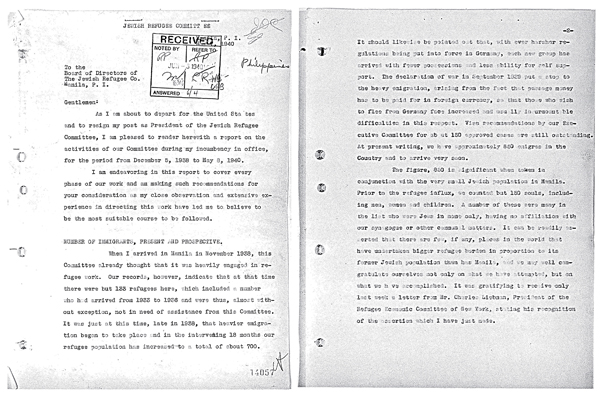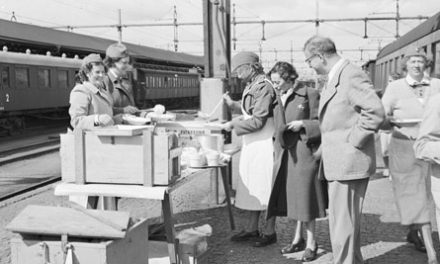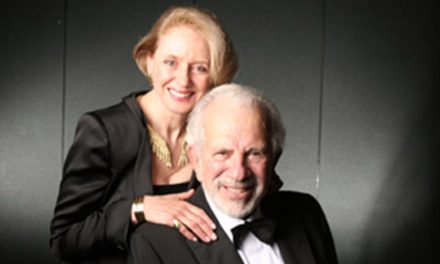
First two pages of May 1940 report written by Alex Frieder, president of the Jewish Refugee Committee in Manila, regarding rescue activities for Jews in the Philippines
The incredible and previously untold story of how over 1,000 German and Austrian Jewish refugees were assisted by five Jewish businessmen from Cincinnati to flee Nazi Europe and immigrate to the Philippines is now vividly brought forth in a new documentary, Rescue in the Philippines.
Employing archival documents, historic images, and primary source interviews, Rescue in the Philippines details how the five Frieder brothers, cigar manufacturers whose factories were located in Manila, the capital of the Philippines, decided to do something to help rescue Jews from Nazi Europe. They used their personal and social connections to collaborate with Manuel Quezon, the first President of the Philippines; Paul McNutt, U.S. High Commissioner to the Philippines, former governor of Indiana, and former Democratic presidential candidate; and Dwight Eisenhower, then an Army Colonel, to secure passports and visas for Jewish refugees from Europe to enter the Philippines as skilled laborers.
Barbara Sasser, Alex Frieders granddaughter and senior consultant to the film, notes that the idea to do the film was prompted by a 2005 event at Cincinnatis Center for Holocaust and Humanity Education to mark the publication of Escape to Manila: From Nazi Tyranny to Japanese Terror, a collection of testimonies from refugees who spent time in Manila. Guests included Susan Eisenhower, President Eisenhowers granddaughter.
The documentary team conducted research in the Philippines, where they interviewed President Quezons grandchildren and visited the National Archives, and at the Eisenhower Library in Kansas, where archivists located a folder containing correspondence between Alex Frieder and Eisenhower. We knew that the relationship continued past the time in the Philippines, but we didn’t have any letters from the Frieder side, Sasser says.
Their research at the JDC Archives, where Executive and Budget Committee meeting minutes, memos, and correspondence testify to JDCs support for the Frieders enterprise, was essential to our being able to present the history in an accurate way in the documentary, Sasser notes.[Click here to read a fascinating May 1940 report by Alex Frieder about his tenure as president of the Jewish Refugee Committee in Manila!]
When asked for the most surprising fact she had learned over the course of the documentarys production, Sasser highlights President Quezons actions, including the donation of his own personal estate as a haven for the refugees, and his moral courage.” She hopes that the documentary will have a lasting impact. When people see the film, [the] circumstance of ordinary people doing extraordinary things, we hope that it will inspire everyone to act when they see an injustice.
Rescue in the Philippines has been screened in New York, San Francisco, Cincinnati, Houston, Maryland, and Austin. A half-hour version of the documentary accompanied by educational materials is in development, and is scheduled to be available by spring 2014.
Please visit the Rescue in the Philippines website to learn more about the research conducted for the film, schedule a screening, and more!



